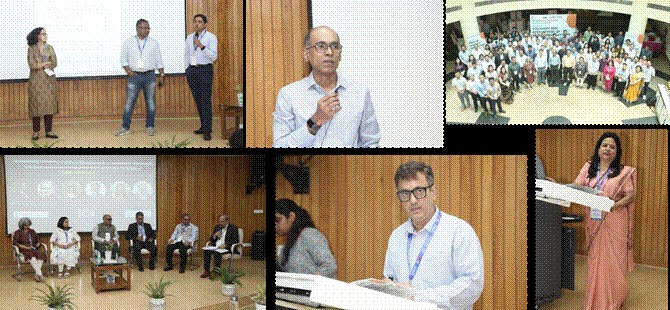Ministry of Science & Technology
BRIC-THSTI hosted a symposium on ‘Discovery and development of monoclonal antibody therapeutics’
Posted On:
10 JUN 2025 6:05PM by PIB Delhi
Translational Health Science and Technology Institute (THSTI) hosted a symposium on the Discovery and Development of Monoclonal Antibody Therapeutics today at its campus. This event brought together leading experts from the pharmaceutical industry, start-ups, CRDMOs, various funding organizations (such as BIRAC, Wadhwani Foundation), and academic organizations for scientific knowledge exchange and to explore innovative models for advancing monoclonal antibody (mAb) therapies in India.
The symposium underscored India's burgeoning biopharmaceutical sector and the immense potential for indigenous innovation in this critical area. A key highlight of the discussions was the urgent need for enhanced collaboration between industry and academia, starting from the earliest stages of innovation and discovery, to develop affordable and indigenous technologies.
In his welcome address, Prof. Jayanta Bhattacharya, Dean, THSTI, emphasized the critical importance of early collaboration between industry and academia at the innovation and discovery stage. He highlighted that such partnerships are vital for developing indigenous and affordable technologies, which can significantly benefit the nation.
Prof. G. Karthikeyan, Executive Director, THSTI, further elaborated on India's significant contributions to the field of monoclonal antibodies. He noted that the current moment is critical, with supportive policies in place. Prof. Karthikeyan stressed the imperative to establish clusters where academia and industry can converge and collaborate. He said that these clusters would serve as fertile ground for training skilled personnel and that symposia like this are instrumental in uniting professionals from diverse sectors.
Dr. Alka Sharma,Scientist H and Senior Adviser, DBT, in her address, brought attention to the Bio-E3 policy (Biotechnology for Economy, Environment & Employment) of DBT, Government of India, detailing its key components. She underscored the pivotal role of mAbs in precision medicine and reaffirmed DBT’s full commitment to their development. The Bio-E3 Initiative aims to catalyze biotechnological self-reliance by investing in advanced platforms like mAbs to combat diseases and strengthen local research and development capacity, reducing reliance on imports and ensuring equitable access to high-quality biologics.
The symposium featured a series of insightful presentations by representatives from various industry players actively engaged in monoclonal antibody research and development. Key sessions included:
- Novel mAb Discovery Platforms: Discussions included "Novel monoclonal antibody discovery by B-Cell Cloning" by Prof. Jayanta Bhattacharya (THSTI), "Novel biologics product development using next generation antibody engineering" by Dr. Maloy Ghosh (Zumutor Biologics), "Mammalian display as tool for antibody discovery" by Dr. KavitaKumari (Syngene International Ltd), and "Fit to Purpose tools for discovery of Antibodies" by Dr. Rakesh Kumar (Aragen Life Sciences).
- Development of Novel mAbs: This session explored topics such as "Antibody Architecture: Guiding Development Pathways and Assessing Manufacturability" by Dr. Priyaranjan Pattanaik (Aurigene Pharmaceutical Services Limited), and "Use of immunization techniques for getting correct immune response leading successful fit for purpose antibody discovery" by Dr. Sridhara Chakraborthy (Syngene International Ltd). Dr. SarikaMehra from IIT-Bombay also presented on "Combining directed evolution with multi-omics analysis to develop a high secretory CHO host cell line." Dr Saurabh Joshi from SPARC shared research insights on “antibody drug conjugates.”
- New Horizons in mAbs: The symposium also delved into cutting-edge advancements with presentations like "A New Era in Biologics: Harnessing Circular RNA to Democratize mAb Access" by Dr. Anand Khedkar (Sekkei Bio Pvt Ltd) and "Where Efficiency Meets Innovation: AI-Driven Antibody Drug Design" by Dr. Aridni Shah (Immunito AI).
The symposium concluded with a panel discussion on "Accelerating Discovery and Early Development of Indigenous Therapeutic Solutions using Monoclonal Antibodies under Bio-E3 initiative," further solidifying the collaborative spirit. The panelists discussed ways to bring more funding to academia-industry collaborations and the need to have more such matchmaking sessions. These efforts are expected to lead to an expanded pipeline of mAb therapies, improved quality of learning and workforce preparation, and ultimately, drive economic growth and social progress.

***
NKR/PSM
(Release ID: 2135445)
Visitor Counter : 373